The plaintiff and the defendant are the parties who resolve the dispute that has arisen between them with the involvement of the court. They can be individual citizens, groups of people, institutions, enterprises, public organizations, and so on. The opposing parties have the rights and obligations outlined in the Code of Civil Procedure of the Russian Federation and other legislative acts. Read more about this in our article.
Plaintiff and defendant - who are they?
The concept of plaintiff and defendant
This designation of the parties is applicable in legal proceedings. In case of a special procedure for proceedings or in administrative legal relations, other names of participants are used: applicant, complainant, interested person. Those involved in legal proceedings are classified into 3 groups:
- court;
- participants;
- helping and promoting justice.
The plaintiff and defendant relate directly to the participants. According to the law, the rights and obligations of the parties in court are equal (Article 38 of the Code of Civil Procedure).
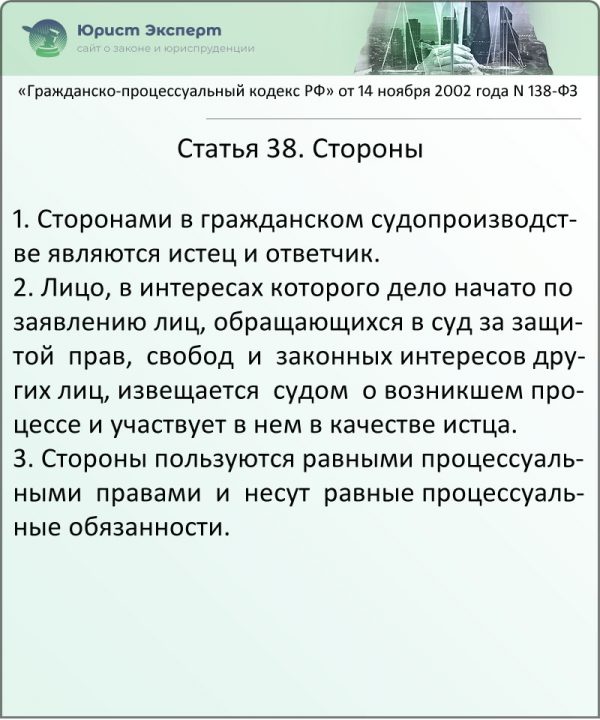
Article 38. Parties (Federal Law No. 138)
Plaintiff - an applicant who filed a lawsuit in court to protect his rights. This party is recognized as active in legal proceedings.
ATTENTION! The initiator of the case can be either the plaintiff directly or the prosecutor or other persons with the rights to go to court. That is, the plaintiff is not necessarily the only person at whose request litigation was initiated.
The defendant is the person who is being sued. He is called to account because the statement appears to be a violator of the law.
The plaintiff and the defendant differ from other persons involved in the claim proceedings:
- the greatest interest in the result;
- presenting a controversial issue on your own behalf;
- speaking in defense of oneself.
A plaintiff may be a group of individuals who file a class action lawsuit. It is also possible to involve several defendants (co-defendants).
Video - Plaintiff and Defendant: concepts
Procedural rights of the parties
The defendant and the plaintiff are endowed with equal rights and obligations as defined by law.
Table. Classification of procedural rights of the parties
| Type of rights | Characteristic |
| Are common | Valid for all persons involved in legal proceedings |
| Special | Exclusive, which are provided only for the plaintiff and defendant |
Both parties are guaranteed equal opportunities to substantiate and confirm their position in court.
Are common
According to Article 35 of the Code of Civil Procedure of the Russian Federation, all participants in legal proceedings are endowed with the rights:
- receive information about materials, nuances of legal proceedings, extracts from it and copies;
- provide and analyze the evidence base;
- ask and clarify information from other involved persons (witnesses, experts, etc.);
- intercede;
- explain orally or in writing in court;
- announce your arguments, challenge and object to other persons;
- receive and provide documents, their copies, including in electronic form via the Internet;
- appeal the court's findings.
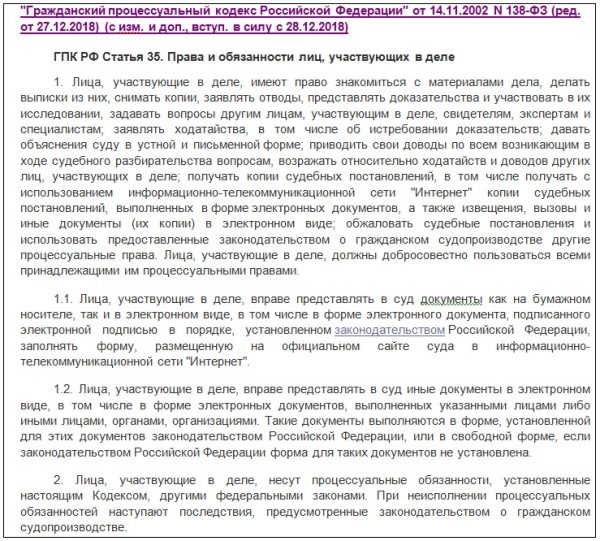
Art. 35 Code of Civil Procedure of the Russian Federation
It is important for the parties not to abuse their rights. Such a violation includes, for example, the deliberate prolongation of litigation in order to delay the adoption of a final verdict or the implementation of procedural measures. In this case, the court has the right to withhold losses incurred as a result of delay, if this condition is indicated by the participants (Article 15 of the Civil Code of the Russian Federation). Recovery for lost time is allowed, the amount of which is determined taking into account the circumstances (Article 99 of the Code of Civil Procedure).
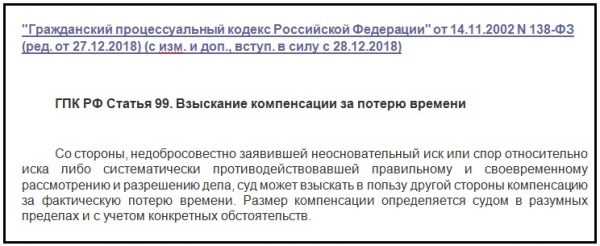
Article 99 of the Code of Civil Procedure of the Russian Federation
Special
The defendant or plaintiff are provided with special rights (administrative). For example, the latter has the right to formalize a waiver of the claim, change its requirement and basis. The court, by its own decision, cannot do this.
ATTENTION! The plaintiff’s refusal of the application is possible at each stage of the proceedings, as a result of which it is terminated.
The defendant has the right to admit the claim absolutely or in part. This action does not end the litigation; the court announces an order to implement the demands presented.
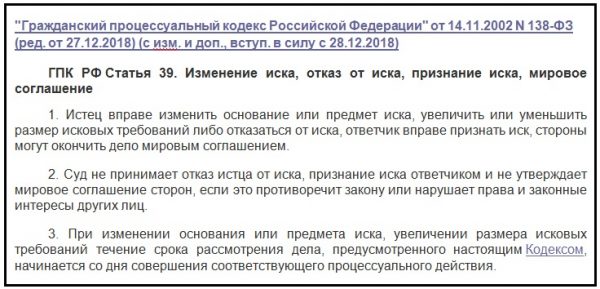
Article 39 of the Code of Civil Procedure of the Russian Federation
Before the court's conclusion is approved, the defendant may file a counterclaim, which is subsequently considered in combination with the first.
According to Art. 138 Civil Procedure Code, it is accepted if:
- the counter-statement fully takes into account the interests of the first;
- recognition of a new claim absolutely or limitedly excludes the satisfaction of the initial one;
- the applications are related, their joint proceedings will speed up the process.
Article 138 of the Code of Civil Procedure
The plaintiff and defendant can enter into a settlement agreement, which asserts rights and obligations in a legal dispute. However, it is not always possible to conclude a bilateral agreement. It is unacceptable to draw up a settlement agreement:
- on determining paternity;
- on compensation for damage to an employee’s health while performing work activities;
- on imposing disciplinary sanctions.
In other cases, when filing a settlement, restrictions are also possible, for example, on withholding alimony for a child under 18 years of age, since the amount of accrual is specified by law.
The court does not accept the plaintiff’s renunciation of the application, the defendant’s consent to the claim, and does not approve the settlement if these actions contradict the legislation of the Russian Federation (Clause 2, Article 39 of the Code of Civil Procedure of the Russian Federation).
Video - Rights of the plaintiff and defendant
Rights, duties and responsibilities of the plaintiff in the process
The basic rights of the plaintiff in civil proceedings are listed in Articles 35 and 39 of the Code of Civil Procedure of the Russian Federation.
Like other participants in the process, he can, in particular, get acquainted with the case materials, present evidence to the court and participate in its study, file petitions, give explanations, appeal court decisions (file an appeal).
But there are rights that are exclusively possessed by the plaintiff .
- Change the subject or basis of the claim. For example, instead of collecting damages, demand compensation for penalties from the defendant. Or, to justify your demands, refer not to a violation of the terms of the contract, but to the poor quality of the delivered goods.
- Increase or decrease the amount of claims. For example, instead of 60 thousand rubles, request 100 thousand rubles. But you will need to pay additional state duty.

- Refuse the claim or enter into a settlement agreement with the defendant. Typically, a participant exercises this right through voluntary settlement of a dispute. For example, he initially doubts that he will win the case, and the defendant offers a partial payment of a sum of money “here and now.”
The plaintiff’s duties have one interesting feature: direct liability is not established for their failure to comply.
The Code of Civil Procedure of the Russian Federation determines that the parties, in particular, must :
- exercise procedural rights in good faith;
- notify the court of a change of residence, reasons for failure to appear at a hearing;
- prove the circumstances referred to in support of their legal position.
But since the process is adversarial, in practice the plaintiff often “fights”.
For example, he does not appear at meetings so as not to answer the judge’s questions, or makes obviously unfounded motions (what is this?), is rude to the defendant, and interrupts other participants in the process. And he is not responsible for such actions.
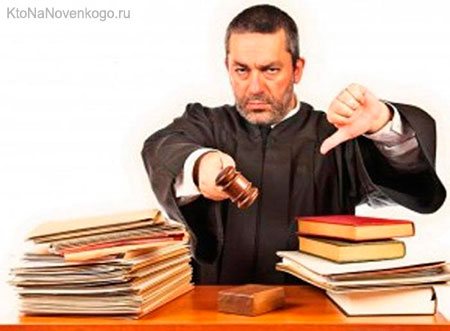
The only negative consequence that can occur is refusal to satisfy the claim. Although this outcome often occurs not due to failure to comply with procedural obligations, but due to a weak legal position in court.
Duties of the parties
When conducting a court hearing, rules apply that must be strictly observed by the plaintiff and the defendant. It is important for both parties to conscientiously approach their responsibilities, since this affects the outcome of the case; their violation may entail additional liability, for example, they should not file groundless and unsubstantiated claims, oppose the consideration of the dispute, deliberately delay the process, and so on. General and special obligations of the parties before the court include:
- fair use of your rights;
- maintaining order during court proceedings. It is important to appear on time for the hearing of the case, and if it is impossible to attend the meeting, notify the participants;
- obedience to the orders and requirements of the presiding officer;
- respectful attitude towards the court;
- payment of state duty by the plaintiff. It can be fixed, represent a percentage of the claim amount, or a combination of options;
- repayment by both parties of the costs associated with conducting an independent study and hiring legal defenders;
- compliance with court orders within the designated period.
Special duties are also determined by the procedural measures applied. For example, when filing a claim, the plaintiff must provide a number of necessary information; both parties undertake to substantiate and confirm the circumstances on which their claims, challenges, and so on are based. If the court has ordered the defendant to pay the costs of the proceedings incurred by the plaintiff, the first must pay them within the appointed time.
Who can file a claim in court instead of the plaintiff?
The plaintiff is not necessarily the one who files the lawsuit.
For example, citizen M. lends citizen K. 100,000 rubles. The debtor does not return the money on time. But citizen M. does not want to drag himself through the courts. He goes to lawyer S. and draws up a power of attorney to file a statement of claim and represent interests .
As a result, Mr. S. draws up a document, goes to court, and then goes to meetings without a client. But the plaintiff is citizen M., since it was in defense of his right to a refund of money that the case was brought.
In what other situations are the persons filing a claim not plaintiffs ? Here are some examples.
- The prosecutor's claim to collect from the organization debt on insurance contributions in favor of the Pension Fund of the Russian Federation.
There is a public legal interest here, since the state is obliged to pay pensions to citizens. The plaintiff in the case is the Russian Federation, not the prosecutor. - A mother's challenge to the refusal to provide her child with a place in the summer group of a kindergarten. The right of a minor to receive an education has been violated.
The plaintiff is a child, and the mother is his legal representative.
- Lawyer's claim against a newspaper to protect the business reputation of an enterprise.
The newspaper's journalists published an article containing information that was untrue and discredited the reputation of the enterprise. As a result, the interests of the latter suffered: the number of customer requests fell. The plaintiff is the enterprise, and the lawyer is the representative by virtue of the employment relationship.
Requirements for the plaintiff and defendant
Capable citizens over 18 years of age have the right to submit an application to the court to resolve a dispute. Up to this age limit, their representatives according to the law (parents, including adoptive parents, trustees) act on behalf of children.
ATTENTION! A person under 18 years of age can himself exercise his rights and obligations in court from the moment of marriage if he is recognized as legally capable (emancipated).
The latter is approved by the guardianship authorities with the approval of both parents (representatives), or without it by order of the court (Article 27 of the Civil Code of the Russian Federation). Also, a child 16-18 years old is recognized as legally capable if he officially works or conducts entrepreneurial activities. In this case, the approval of the parents (adoptive parents, trustees) is required, but they are not responsible for the obligations of the emancipated relative.
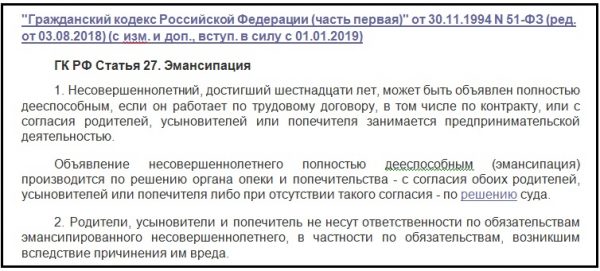
Article 27 of the Civil Code of the Russian Federation
Children aged 14-18 (as well as people with partial legal capacity) are involved in legal proceedings together with their representatives according to the law. Sometimes minors have the right to defend their rights themselves (for example, in the process of compensation for damage - Article 1074 of the Civil Code of the Russian Federation). But the court can also call on representatives of the child (clause 4 of Article 37 of the Code of Civil Procedure). The rights of parents under 18 years of age are outlined in Art. 62 of the RF IC, for example, they have the right to declare paternity determination in court.
How should a witness behave in court?
If a person is a witness in a case, then he does not have the right to be present in the courtroom during the consideration of the case. You also need to remember:
- The witness will be invited into the courtroom only when the time comes for his questioning.
- Before the start of the interrogation, the witness will be explained his rights, including the right not to testify against himself and/or his loved ones, and the witness will also be warned about criminal liability for refusing to testify and for giving knowingly false testimony.
- The witness gives his testimony standing. If it is difficult for a witness to stand, he can ask the court to be able to testify while sitting, indicating the reason, and if the court allows, he can testify without standing up.
- When answering questions from the plaintiff, defendant, court, and other persons participating in the case, the witness must give truthful testimony.
- If the witness does not remember or does not know some circumstances, there is no need to invent anything, it is necessary to answer as it is, that is, “I don’t remember”, “I don’t know” or “not known”.
- In certain cases, a witness may use written evidence when giving an explanation.
- A witness cannot coordinate his testimony in court with anyone, since he is obliged to give truthful testimony about the circumstances that are known to him.
- After questioning, the witness remains in the courtroom unless the court allows him to leave the courtroom.
Lawsuit: concept
A statement of claim is a request of a person sent to the court to protect his rights and interests and to resolve a dispute. In the paper, the plaintiff describes the current situation and outlines his demands. Article 131 of the Code of Civil Procedure of the Russian Federation presents the contents of the claim, which includes:
- names of the court, details of the parties;
- description of violations, circumstances on the basis of which requirements are established, evidence;
- cost of the claim, calculation of amounts of money (for withholding, challenging);
- list of attached documentation, other clarifying information.
ATTENTION! When generating an application electronically through the official court resource, it will need to be certified with an enhanced electronic signature.
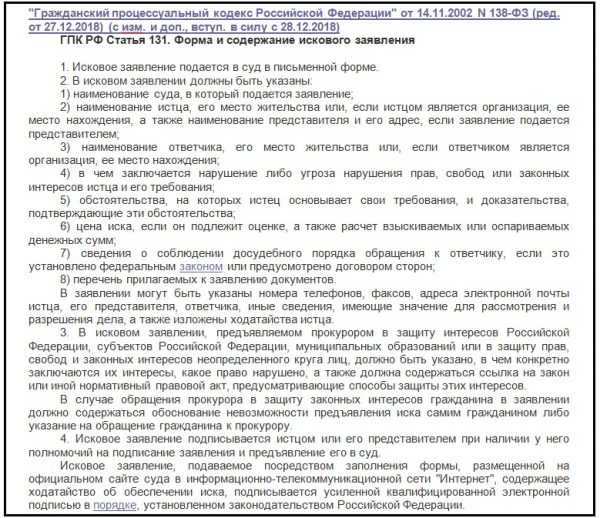
Article 131 of the Code of Civil Procedure of the Russian Federation
After sending the application, the court informs the plaintiff in writing about the stage of the case and the start date of the process. The defendant is invited to the hearing by sending him a summons.
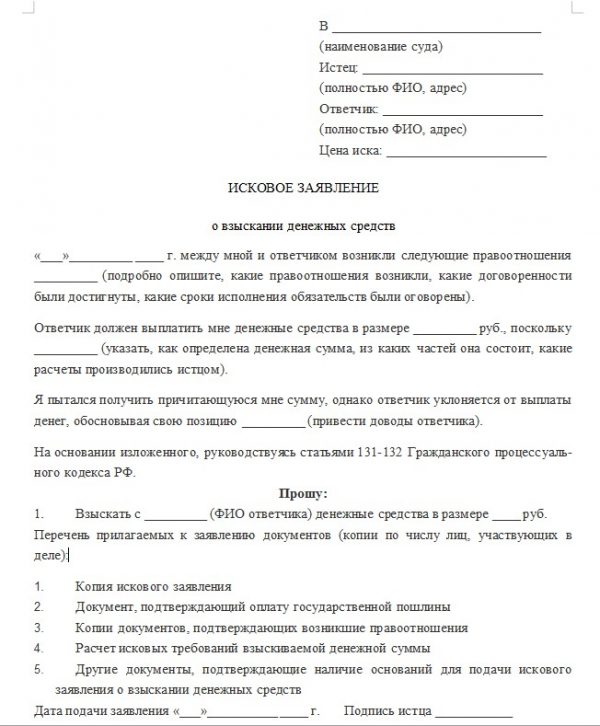
Example of a claim
Trial
When resolving legal disputes, the court, the plaintiff and the defendant are involved. The latter oppose each other because they have opposing positions. The court examines the plaintiff's claims, and the defendant accepts or denies them. Both sides present evidence of their position. The final verdict is made by the court, based on materials and research. It is possible for groups of plaintiffs and defendants to be present in the proceedings (Article 40 of the Code of Civil Procedure), with each of them representing their own interests, regardless of their accomplices. For example, one of the defendants may approve the claim, the other may file a counterclaim, and so on. It is permissible for one or more participants to conduct a business. Complicity is applied if the reason for the disagreement is identical or similar rights and obligations of the plaintiffs or defendants; they have the same basis.
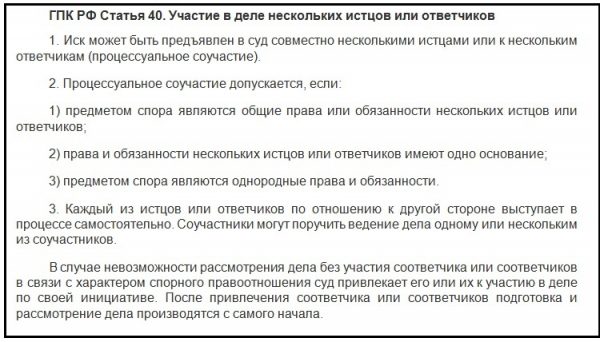
Article 40 of the Code of Civil Procedure
Whether to involve a co-plaintiff or a co-defendant is determined by the court at the preparatory stage (Article 150 of the Code of Civil Procedure). Once they are involved in litigation, they begin anew. Sometimes during legal proceedings it turns out that the person to whom the claims are made is not the defendant. However, such an outcome is unlikely when there is a direct identification of the culprit:
- in case of moral damage;
- the defendant is the owner of a source of increased risk;
- when disseminating false information that discredits dignity or reputation.
In other cases, the plaintiff may make a mistake when appointing the defendant, that is, he is recognized as improper if there is no possibility of the accused being involved in the violation. As a result, the defendant is replaced at the direction of the party. If the plaintiff does not approve of the changes, the proceedings are carried out on the basis of the presented claim (Article 41 of the Code of Civil Procedure). The party is also replaced during procedural succession. It is permissible when there is a change in the persons in the obligation. For example, in the event of the death of a person, reorganization of a company, forgiveness of debt, and so on. Then the court replaces the party with a legal successor at some stage of the proceedings. In this case, all actions carried out before this are preserved in relation to the new person involved in the legal proceedings.
Succession is unacceptable if:
- demands are sent to a specific individual (in cases of divorce, alimony withholding, and so on);
- contrary to law or contractual relations.
ATTENTION! Substitution of the plaintiff is permissible only with his approval. Otherwise, the litigation ends. The replacement of the defendant is carried out without his approval by judicial determination.
It is possible to involve third parties in the proceedings. They are also interested in the outcome of the dispute, but, unlike the plaintiff, they do not initiate the process. For example, during a divorce, a spouse claims to divide a car purchased during marriage. However, during the proceedings, a third party appears - a company that claims that the husband rented this car from them. It turns out that the spouse is not the owner of the car, and the organization is making independent demands for a return or monetary compensation.
An important issue of interest to both parties is the need to tell the truth at a court hearing. However, such a requirement for the plaintiff and defendant has rather a moral component, since it is not specified by law. According to Art. 51 of the Constitution of the Russian Federation, a citizen is not obliged to provide information that acts against him and his close relatives. Punishment for lying is defined only for witnesses, experts, specialists, and translators (Article 307 of the Criminal Code of the Russian Federation).
The plaintiff and defendant are the main participants in the proceedings, who are most interested in the final result. Two opposing sides, endowed with equal rights and obligations, prove their own position and challenge the opposite one. The final verdict is announced by the court, based on the case materials, the results of the measures taken and the legislation of the Russian Federation.
Involvement of accomplices in the arbitration process
The arbitration court (as a court of first instance) has the right to involve a new person as a defendant in the dispute under consideration if this is implied by the legal act governing the dispute. Another basis for involvement without the consent of the parties is the consideration of a dispute that arises from legal relations of a non-entrepreneurial or economic nature - administrative and any other public. The defendant cannot refuse his participation, however, other participants in the process have the right to petition for the cancellation of the ruling drawn up on the basis of a petition for the participation or cancellation of participation in the process of an accomplice, in higher arbitration courts - in the appellate instance. The period for appeal is 10 calendar days. The starting point is the day the arbitration court of first instance rendered its ruling. The arbitration court independently draws up a petition to involve a co-defendant in the case, if it has the authority to do so within the framework of the law, sends it to the address of the place of residence or location of this co-defendant, and attracts him to participate in the process. If, for good reason, the co-defendant cannot appear at the court hearing, then his interests may be represented by an authorized fiduciary.
In addition, the co-defendant can defend his interests and rights in the dispute by all legal means, including involving lawyers and human rights defenders in the process.
If one of the parties (plaintiff or defendant) requests the participation of an accomplice, then the court has the right to accept or refuse the request on legal grounds. The judge of the arbitration court draws up a ruling on a certain decision: on accepting a petition for participation in the case, on canceling this petition, on the entry of a co-plaintiff into the dispute. This determination may be accepted by the parties or may be appealed. When making a decision to involve additional participants in the arbitration process, the judge or judges are guided exclusively by the current norms of Russian legislation, the Arbitration Procedure Code of Russia, related federal laws and other regulations related to the case under consideration.







